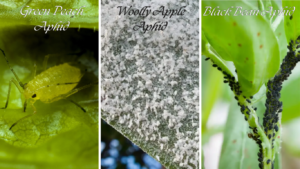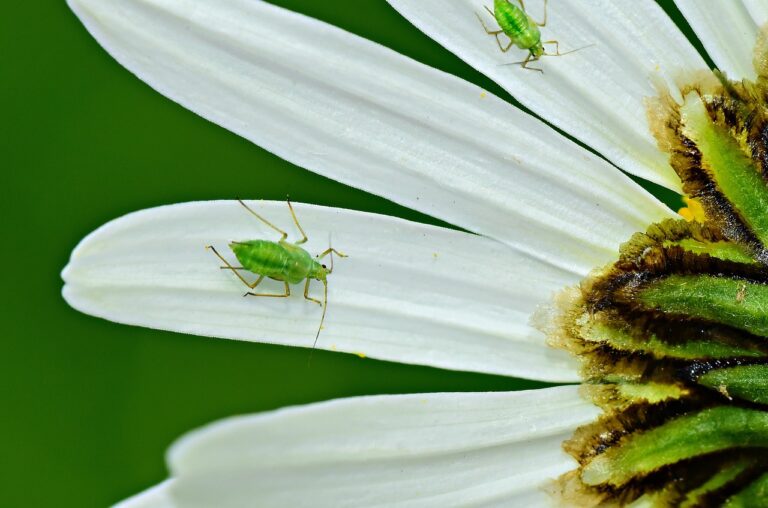Aphids are common garden pests that can cause significant damage to your plants. Understanding aphid control is crucial to protecting your garden from these sap-sucking insects, which weaken plants and spread diseases. For more tips on maintaining a healthy garden, explore our guide on companion planting for pest control. Additionally, if you are growing sunflowers, check out how to keep them aphid-free in our sunflower growing guide.
What Are Aphids?
Aphids, also known as plant lice, belong to the insect family Aphididae. There are over 4,000 species of aphids worldwide, with common varieties including the greenfly, blackfly, and woolly aphid. Aphids are known for their ability to reproduce rapidly, making them a persistent problem for farmers and gardeners alike.
Aphids typically measure between 1 to 10 mm and can be winged or wingless, depending on their stage of development and environmental conditions. They primarily feed on plant sap, using specialized mouthparts to pierce plant tissue.
Types of Aphids:
- Green Peach Aphid
- Woolly Apple Aphid
- Black Bean Aphid

Aphid Anatomy and Behavior
Aphids have a unique life cycle that allows them to adapt to changing environments. They can reproduce asexually, giving birth to live young, which makes them multiply quickly. Many species also have winged forms, allowing them to migrate and colonize new plants.
Aphids thrive on a wide range of plants, from vegetables to fruit trees. They feed by sucking sap, which weakens plants and leads to:
- Stunted growth
- Leaf curling
- Reduced crop yields
One of the most fascinating aspects of aphid behavior is their symbiotic relationship with ants. Ants “farm” aphids, protecting them from predators in exchange for a sweet substance called honeydew, which aphids secrete.
Read more about the intricate Aphid Life Cycle and their role in the ecosystem.
The Impact of Aphids on Plants
Aphids can cause significant damage to plants. In addition to weakening them by feeding on sap, they also transmit plant viruses, which can devastate crops. Some of the effects of an aphid infestation include:
- Leaves turning yellow or brown
- Plant diseases transmitted via saliva
- Production of sooty mold, a black fungus that grows on the honeydew
Controlling aphids early is essential to prevent long-term damage to plants, especially in agricultural settings. Aphid infestations are particularly harmful to crops like soybeans, wheat, and fruit trees.
For further guidance on how to manage aphids on crops, visit the Aphid Control Methods resource from the University Extension.
Best Natural Methods for Effective Aphid Control
Implementing natural methods for aphid control can help manage infestations without harming beneficial insects or the environment. Here are some of the most effective strategies:
- Introduce Natural Predators: Ladybugs, lacewings, and hoverflies are excellent at controlling aphids. These predators feed on aphids and can naturally reduce their population.
- Neem Oil: This natural pesticide disrupts aphids’ feeding and reproduction, making it an effective organic solution for aphid control.
- Insecticidal Soap: Spraying insecticidal soap directly onto aphids kills them on contact while being safe for plants and other insects.
- Companion Planting: Grow plants like garlic, marigolds, or chives near vulnerable crops to repel aphids.
By using these methods, you can achieve effective aphid control and keep your garden thriving without the use of harsh chemicals.
Organic Aphid Control Methods
In addition to natural predators, you can use organic solutions to control aphid populations. These include:
- Neem oil: A natural insecticide that disrupts the aphids’ feeding and reproduction.
- Insecticidal soap: A safe and effective option for killing aphids on contact without harming beneficial insects.
- Water spray: A strong jet of water can physically dislodge aphids from plants, reducing their numbers.
For large-scale infestations, you may need to consider integrating multiple control strategies to effectively reduce the aphid population.
Preventing Aphid Infestations
Prevention is key to minimizing aphid damage. Simple gardening techniques can reduce the risk of aphid infestations:
- Crop rotation: Changing plant locations each year prevents aphids from building up in one area.
- Companion planting: Certain plants, such as marigolds and garlic, can repel aphids and protect other plants.
- Healthy soil: Maintaining nutrient-rich, well-drained soil strengthens plants, making them less vulnerable to aphid attacks.
Common Aphid Species and Their Host Plants
Different species of aphids prefer specific host plants. Here are some of the most common types of aphids and their favorite plants:
- Green Peach Aphid (Myzus persicae): Attacks peaches, potatoes, and tomatoes.
- Woolly Apple Aphid (Eriosoma lanigerum): Targets apple trees and ornamental plants.
- Black Bean Aphid (Aphis fabae): Feeds on beans, spinach, and sugar beets.
Knowing the host plants for various aphid species can help you take early preventive measures to protect your crops.
FAQs About Aphids
How Do I Get Rid of Aphids Permanently?
There is no single permanent solution, but integrating biological controls, organic treatments, and regular plant maintenance can keep aphid populations under control.
Do Aphids Harm Humans?
No, aphids do not bite or harm humans. Their primary threat is to plants, especially in agriculture and gardening.
What Is the Best Way to Kill Aphids Naturally?
Using a combination of natural predators, like ladybugs, and organic treatments, such as neem oil, is the most effective natural approach.
Can Aphids Be Beneficial?
In some ecosystems, aphids play a role as prey for beneficial insects, which helps maintain balance in the environment.
How Long Do Aphids Live?
The lifespan of an aphid is relatively short, typically around 30 days. However, their rapid reproduction makes them difficult to manage if left unchecked.
Conclusion
Aphids are a persistent but manageable pest that can cause significant damage to crops and gardens if left untreated. By understanding their biology, behavior, and the methods of controlling them, you can protect your plants from these tiny sap-suckers. Incorporating natural predators, organic control methods, and preventive gardening techniques will help you keep aphid populations at bay and ensure the health of your plants.
To dive deeper into aphid behavior and their relationship with plants, explore this Aphid-Plant Symbiosis academic study.
